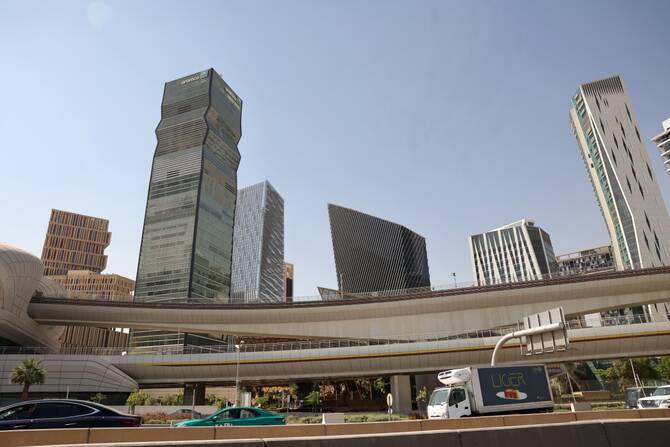RIYADH: French Ambassador to Saudi Arabia Ludovic Pouille has shared his 18-month experience living in the Kingdom and his vision to strengthen relations, enhance economic opportunities, share cultures, develop tourism and promote rapprochement between both countries.
Pouille is keen to show France the rich cultural heritage, tradition and picturesque natural landscapes of the Kingdom. He hopes that “the French can also discover the treasures and beauties of Saudi Arabia.”
And, likewise, he wants Saudis to experience French tourism and hospitality.
Pouille believes that Saudi Arabia has three distinct characteristics: Hospitality, 70 percent of the population being younger than 35, and its status as an ambitious country. “It is very stimulating for an ambassador to be in a country that is young, dynamic and has ambition,” he told Arab News en Francais.
The French envoy shed light on AlUla becoming a phenomenal tourist destination and the Saudi-French partnership signed in 2018 for the sustainable tourism development of the region.
“A few days ago, we celebrated the first three years of the implementation of this partnership, and above all we have drawn, with Saudi Minister of Culture Prince Badr, the French minister of foreign affairs, the French minister of culture and Saudi Investment Minister Khaled Al-Faleh, very promising prospects for this partnership in the coming years,” he said, adding: “I have no doubt that AlUla will become a global tourist destination.”
Pouille said that archaeological cooperation between the two countries goes back 20 years, when in 2002, a mission by Laila Nehme explored the Nabataean civilization in AlUla. Since then, and after many successful endeavors, Pouille said: “We currently have five missions unearthing in the AlUla region — the secrets of the pre-Nabataean kingdoms of Dadam and Lihyan, the Khaybar region, the old city of AlUla and its oasis.”
The tourism development of AlUla aims to attract 2 million visitors per year by 2030.
Beyond archaeological discoveries, a further strategy is to develop sustainable agriculture and urbanism, and renewable energies, thus creating a complete ecosystem.
Pouille revealed that several interested French companies have signed contracts with the Royal Commission for AlUla.
He also lauded an agreement signed last year with the Cordon Bleu Institute to open a Riyadh institute, and praised the establishment of the Ferrandi School — one of the world’s greatest gastronomic schools — in AlUla.
In addition to AlUla, similar development in other regions like Taif and Asir will also draw tourists in the near future.
“I discovered a country of great wealth. It has ancient cities and modern megacities. For all these reasons, I believe that Saudi Arabia has a very important touristic potential,” he said.
“Saudi Arabia also harbors mountains of a 3,000 meter altitude with vegetation and rain for a good part of the year, without forgetting the 1,400 kilometers of coasts along the Red Sea, full of corals and an extraordinary fauna. The Farasan Islands are fantastic and NEOM has an extraordinary ecological heritage.
“These destinations are the value that tourists will look for,” Pouille said.
“France, the world’s leading tourist country, needed decades to get there. Saudi Arabia, with its dynamism, will reach there in a few years,” he added.
The French ambassador said that Vision 2030 is a very broad agenda that concerns the economy, culture, heritage and digital transformation, and that France sees itself as a partner in this process.
The French Vision 2030 was launched a few months ago and shares many of the same ambitions of the Kingdom’s Vision 2030, which was launched by Crown Prince Mohammed bin Salman in 2016.
“It wants to respond to the same challenges, such as the energy transition that can lead to preserving the environment and biodiversity, and the digital transition that must be able to be accompanied by economic growth and not massive unemployment,” he said.
According to Pouille, France can play a role in the development of new projects under Saudi Vision 2030.
French President Emmanuel Macron, during his visit to Jeddah in December, where he met with the crown prince, said that he wanted to establish a global partnership with the Kingdom, but one that was not only limited to the political, military and economic fields.
“The president’s visit has opened up great prospects through agreements signed in the fields of tourism, culture, digital and space,” he said, adding that the two countries will embark hand in hand toward 2030.
For mutual beneficial interests, a Franco-Saudi business forum was also held parallel to the visit.
Cultural rapprochement is a theme very dear to the heart of the ambassador, who tries to be a “cultural transmitter,” as he considers diplomacy beyond governments and economic interests, and believes in creating bridges between peoples.
After the world came to a halt due to the COVID-19 pandemic, Pouille hopes that in 2022, things will be promising as many Saudis have found their way back to France, and vice versa. “The month of the Francophonie (marked in March around the world) is a very important month for our cultural activities in the Kingdom,” said Pouille.
“It is true that Saudi Arabia is not a French-speaking country, but it has 200,000 French-speaking residents. We are working with our partners to build, in March, a program of cultural, educational and musical events. Conferences and exhibitions will be organized to celebrate, not only in the French language, but also diversity and multiculturalism through the preservation of languages and cultural identities,” he said.
He added: “I remain hopeful that the French language will be reintroduced in Saudi public schools as it was in the 70s and 80s, because French is a global language: The second most learned language on the planet and the third language of business. We hope to establish more branches and more language centers to generalize the learning of the French language in the Kingdom.”
At the end of the interview, Pouille showed three calligraphy works by Saudi artists in his garden at La Residence de France in Riyadh.
















